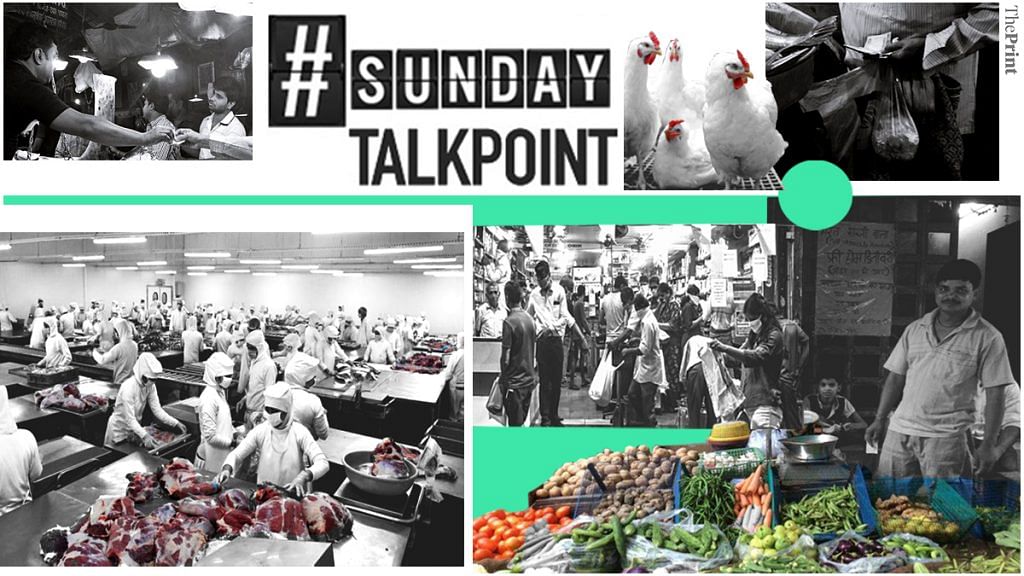Ever since the Covid-19 outbreak, people across the world have sought to link the coronavirus to non-vegetarian diets. Queen guitarist Brian May said this pandemic came from “people eating animals”. In India, Haryana health minister Anil Vij urged people to become vegetarian. AIIMS Director Dr Randeep Guleria has clarified that non-vegetarian food doesn’t cause the infection.
ThePrint asks: Will more people turn to vegetarianism in a post-coronavirus world?
Indians think vegetarianism is a virtue rather than a life choice. Well, it doesn’t matter to the coronavirus
Senior copy editor, ThePrint
If you want to stop eating non-vegetarian food, do it for the right reasons — you want to do your bit to fight climate change, you care about animals, you care about your health indicators. Don’t do it because it’s the only lesson you took away from the coronavirus crisis.
As soon as the first few people tested positive for Covid-19 in India, #NoMeatNoCoronavirus started trending on Twitter. Indians commented about how the virus was the ‘wrath of god’ for eating meat, how it was a ‘punishment’ for meat-eating China. Rumours started doing the rounds on how vegetarians don’t get infected. A post on social media went viral (the irony) that claimed the WHO has said no vegetarian in the world has been infected by coronavirus. It was fake news of course, but it pointed to one truth — Indians see vegetarianism more as a good virtue rather than a life choice. Meat is associated with impurity, pollution, certain religions and of course, paap.
The coronavirus outbreak started in China because of unhygienic conditions, illegal wildlife trading and packed markets. It could have started anywhere in the world. Eating poultry or not eating it, will not save you. Eating right, eating clean, will.
Coronavirus or not, turning vegetarian is good. It is economical, environment-friendly and against animal cruelty
Journalist, ThePrint
Coronavirus will change a lot of things. Once the pandemic is over, nothing is going to be the same, including our food habits. Scientists say it is likely that the coronavirus came from bats. Although food safety experts have clarified that the coronavirus is not caused by eating meat, the way this virus has shaken our world, it is not easy to convince people.
The virus has already given rise to social stigmatisation to an extent that RWAs are turning into a nightmare and doctors are being attacked. Now when there are reports and conversations around how wet markets in China’s Wuhan and bats are possibly responsible for all the mess, it is likely that a lot of people would turn their back on meat. Remember how quickly the world adapted to ‘Namaste’ instead of shaking hands.
Personally, coronavirus or no coronavirus, I believe that turning vegetarian is a good practice. Vegetarianism is economical, environment-friendly and against cruelty to animals. Think about all the use of antibiotics in animals and making them prey to fulfill our food needs while breaking away the food chain. Even if people do not turn vegetarians to save the lives of the animals, I think this pandemic could be a beginning towards that path since it affects our lives.
Perception that coronavirus originated from animals is likely to affect diet choices in the post-pandemic world
Special Correspondent
Whenever the world comes out of the ongoing coronavirus crisis, one thing is for sure — people’s attitude towards many things will change and one of them will be food. Among the several theories about the coronavirus that spreads the Covid-19 disease, the most agreed upon by scientists across the world is that pangolins served as the “intermediate host” andpassed on the virus from bats to humans. The origin lies in China’s wet markets in Wuhan that sell all kinds of exotic animals for consumption.
Whether the virus actually originated in Wuhan wet markets or not, this theory is sure to have an impact on the way people eat. This is bound to make people more careful and move towards a vegetarian diet. However, chances of people turning vegetarian are still far-fetched, specially in India.
Besides, diseases like Swine Flu that have caused a threat to the existence of humankind in the past also originated from animals, which gives more weight to the argument that people might turn vegetarian in a post-coronavirus world. Having said that, there is no direct connection to being a meat eater and getting any disease, it’s all about perception at the end of the day.
The myth that meat-eaters have caused coronavirus is nothing but vegetarians taking a moral high ground
Journalist, ThePrint
I don’t think that the coronavirus outbreak is going to change my meat-eating habits. They say that distance makes the heart grow fonder. One of the first things I’m going to do when this crisisis over is devour those hot chicken wings from Nando’s.
At the same time, I will be slightly more cautious about the quality of restaurants I dine at. I imagine it will take other meat-eaters some more time to finally trust that roadside kebab again. However, my hesitation will not be able to keep me away from meat for long.
Sentiments aside, there have been no studies so far that conclusively prove that eating meat is responsible for the outbreak of coronavirus. Indulging in the myth of meat-eaters causing coronavirus is the classic moral high ground vegetarians like to take. I believe that these myths and rumours are just getting started. Just like the number of cases of xenophobia increasingwith the number of coronavirus cases across the globe.
Giving into rumours to hold a seemingly unrelated habit accountable for a global pandemic should merely be seen as a futile attempt at making sense of things during unprecedented times.
Also read: In coronavirus crisis, are RWAs helping or becoming vigilantes?
By Pia Krishnankutty, journalist at ThePrint
